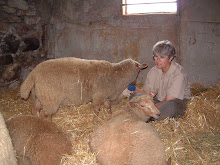I read with interest the article in the Ontario Sheep News on fish meal supplementation to supply omega 3 fatty acids in ewe ration and its impact on the subsequent lamb's ability to withstand a bacteria toxin challenge (endotoxin). While it was scientifically interesting, this is not the direction that our farm wants to go.
The first reason is that sheep are herbivores, not omnivores, and feeding animal-based proteins to herbivores is what got the sheep industry into problems in the first place with conditions like scrapie. No, I am not saying that fish meal can transmit scrapie, but I am questioning a nutritional supplement that is so totally foreign to the natural diet of sheep.
The second reason is the effect of the fish supplement on the quality of the meat. As a teenager, we lived in Sweden. At that time, the Swedish pork industry was using a fish based feed supplement. It was, beyond the doubt, the worst pork I had ever eaten with a distinctly fishy flavour to the meat. We do not want to use any feed supplement that can create off flavours in the meat and reduce the quality of our product.
Man's manipulation of domestic animals is but a moment of time in the evolutionary scale. That is especially true with respect to recent manipulations for the more intensively raised livestock.
Sheep have evolved to breed at a time so that the lambs were born when vegetation is young, supporting the increased nutritional demands for a lactating ewe as well as for a rapidly growing lamb. In our climate's case (and the British and European breeds that have evolved for our climate) that means a birth in April or May. Not surprisingly, omega-3 fatty acids in forage peak at the same time as lambing. Forage sugars and proteins also peak at that time.
All this begs the economic and in some cases physiological costs of trying to paddle against nature's current. In my opinion the way to minimize health problems and economic costs in your flock is to quit trying to breed out of season.
The demand for Easter lamb actually originated in the Mediteranean where the climate naturally produces lamb in that season. So is it reasonable to expect production systems in a northern climate using breeds developed in northern climates to try to mimic a Mediteranean production system using Mediteranean breeds? My opinion is no.
Does that mean only seasonal availability of lamb? Sure, but it is a long season from spring lamb in May, June to heavy lambs from September to January or even later. Off season, there is hogget and mutton, two very good meats that need to be promoted again.
Each shepherd must make their own decision as to the production system they want but they must recognize going against our climatic realities comes at an economic and management cost. At Hawk Hill, we acknowledge the realities of our climate, our breeds and our forage production season and manage our breeding and marketing to reflect that reality.
TTFN,
Laurie
Monday, April 2, 2012
Why we don't go against nature at Hawk Hill
Labels:
breeding,
Easter lamb,
natural,
nutrition,
omega 3 fatty acid,
season,
sheep
Subscribe to:
Post Comments (Atom)


Laurie
ReplyDeleteRan across your blog quite by accident this morning. And I read your comments on fish meal supplements.
I completely agree with you. There will never be any fish meal fed to the sheep on our place.
Cows and sheep are built to eat grass and grains - period.
Sems to me the cattle industry has had its issues as well. We lived through that as well on this farm.
What with American beef now routinely being fed chicken litter I am also against cheap filler.
Having traveled the world and lived in some pretty "not nice places" I am always glad to come home to this part of the world where I know what the food on my plate has been fed.
Grass and grains. Sheep thrive on them and it is time we all remembered that and kept reminding the "progressives" of this.
It matters.
My best
Bruce